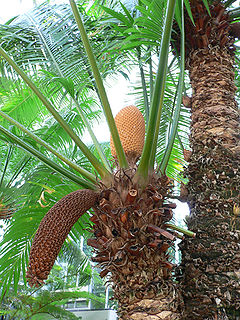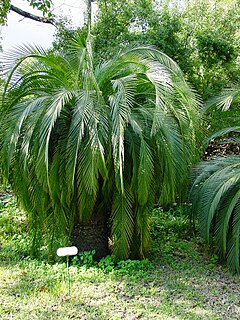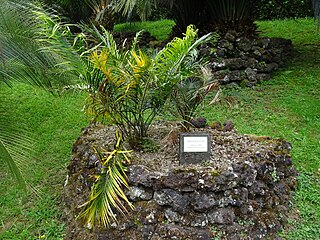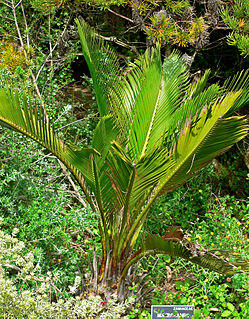
Cycads are seed plants with a very long fossil history that were formerly more abundant and more diverse than they are today. They typically have a stout and woody (ligneous) trunk with a crown of large, hard and stiff, evergreen leaves. They usually have pinnate leaves. The species are dioecious, therefore the individual plants of a species are either male or female. Cycads vary in size from having trunks only a few centimeters to several meters tall. They typically grow very slowly and live very long, with some specimens known to be as much as 1,000 years old. Because of their superficial resemblance, they are sometimes mistaken for palms or ferns, but they are not closely related to either group.

The Zamiaceae are a family of cycads that are superficially palm or fern-like. They are divided into two subfamilies with eight genera and about 150 species in the tropical and subtropical regions of Africa, Australia and North and South America.

Macrozamia is a genus of around forty species of cycads, family Zamiaceae, all of which are endemic to Australia. Many parts of the plant have been utilised for food and material, most of which is toxic if not processed correctly.

Macrozamia communis is an Australian cycad found on the east coast of New South Wales. The common name for the species is burrawang, a word derived from the Daruk Australian Aboriginal language; this name is also often applied to other species of Macrozamia.

Macrozamia moorei is a cycad in the family Zamiaceae, native to Queensland (Australia).

Macrozamia fraseri is a species of plant in the family Zamiaceae. It is endemic to the south west of Western Australia, and restricted largely to the sandy soils of the Swan Coastal Plain and Geraldton Sandplains. The range of Macrozamia fraseri overlaps that of Macrozamia riedlei.

Macrozamia glaucophylla is a species of cycad in the family Zamiaceae. It is endemic to New South Wales, Australia.. This species resembles palms but are taxonomically quite different..The current population trend of this species is stable with 2,500-10,000 mature individuals. The habitat type of this species are forest and savanna, living in a terrestrial system.

Macrozamia johnsonii is a species of cycad in the family Zamiaceae. It is endemic to New South Wales, Australia.

Macrozamia lucida is a species of plant in the family Zamiaceae. It is endemic to Australia.

Macrozamia macdonnellii, common name MacDonnell Ranges Cycad, is a species of plant in the family Zamiaceae. It is endemic to the Northern Territory, Australia.

Macrozamia riedlei, commonly known as a zamia or zamia palm, is a species of cycad in the plant family Zamiaceae. It is endemic to southwest Australia and often occurs in jarrah forests. It may only attain a height of half a metre or form an above trunk up to two metres with long arching fronds of a similar length. The giant cones amidst the crown of palm-like fronds contain edible seeds surrounded by red sarcotesta. The seeds are consumed by birds and animals, and can be a favoured part of the human diet when prepared correctly. M. riedlei benefits from a close association with bacteria that fix nitrogen, which also produce substances found throughout the plant that are toxic to some animals when consumed. The species is cultivated for ornamental use in urban and domestic environments.

Macrozamia secunda is a species of plant in the family Zamiaceae. It is endemic to New South Wales, Australia, where rainfall is fairly constant throughout the year. Its seeds are a reddish color and its fronds are generally somewhere between blue and grey in color.

Macrozamia spiralis is a species of cycad in the family Zamiaceae. It is endemic to New South Wales in eastern Australia, where it is found in sclerophyll forest on low-nutrient soils. Plants generally lack a trunk and have 2–12 leaves that range up to 100 cm (40 in) in length.
Boganiidae is a family of beetles, in the suborder Polyphaga. Members of the family are found in southern Africa, Australia and New Caledonia. Adults and larvae are pollenivorous, feeding on the pollen of cycads and Myrtaceae, Meliaceae, Cunoniaceae and Elaeocarpaceae angiosperms. Metacucujus and Paracucujus act as pollinators for cycads Encephalartos and Macrozamia respectively. This association with cycads goes back to at least the Mid-Cretaceous, with an extinct form being found with preserved cycad pollen in 99 million year old Burmese amber.

Aulacaspis yasumatsui, or cycad aulacaspis scale (CAS), is a scale insect species in the genus Aulacaspis that feeds on cycad species such as Cycas revoluta or Dioon purpusii. Other common names include the cycad scale, the sago palm scale, and the Asian cycad scale. This is a serious pest of cycads which can kill its host plant.
Macrozamia macleayi is a species of cycad in the family Zamiaceae endemic to Queensland, Australia.
Macrozamia machinii is a species of cycad in the family Zamiaceae endemic to Queensland, Australia. It is found near Inglewood in the Darling Downs area.
Paul Irwin Forster obtained his doctorate in 2004 with his thesis: The pursuit of plants : studies on the systematics, ecology and chemistry of the vascular flora of Australia and related regions, from the University of Queensland.












